Converse are not designed as running shoes. They lack the necessary support and cushioning for running.
Converse sneakers, iconic for their casual style, have traversed fashion trends with their classic design. These shoes provide a versatile option for everyday wear and for those who favor retro or street-style aesthetics. Despite their popularity, Converse is more suitable for casual outings than performance activities.
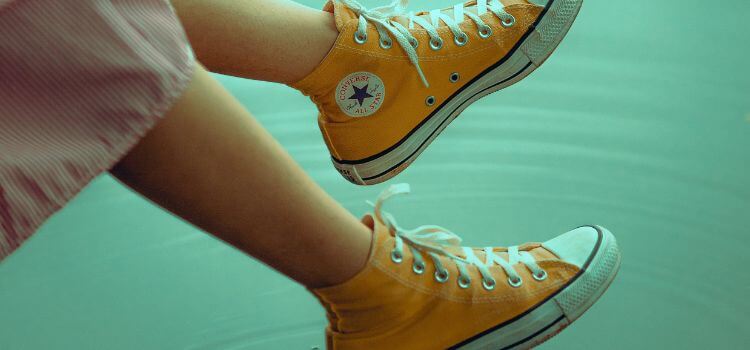
They originate from a basketball heritage, offering a flat sole that doesn’t align well with the contours of running. When selecting the appropriate footwear for long-distance or daily runs, one should prioritize shoes specifically engineered with running in mind. These running shoes will guarantee the support, comfort, and durability needed to protect the feet and enhance running performance.
Converse Sneakers: A Cultural Icon
Converse sneakers have woven their way deep into the fabric of popular culture. From classic films to the feet of iconic musicians, these shoes symbolize effortless style and a nod to a rich history. They are not mere footwear but badges of creative expression and unconventional charisma.
The Rise Of Converse In Pop Culture
Converse surged from athletic footwear to a pop culture staple in the last century. Celebrities and rebels laced up these sneakers, exuding a sense of belonging to a counterculture movement.
- Rock’n’roll legends embraced the high tops.
- Movies like “The Breakfast Club” cemented their cool status.
- Skateboarders and artists found their perfect fit.
Evolution Of Shoe Design
Once designed for the basketball court, Converse evolved to meet the aesthetic and lifestyle of the youth. Bold choices in colors and design kept the brand fresh and relevant.
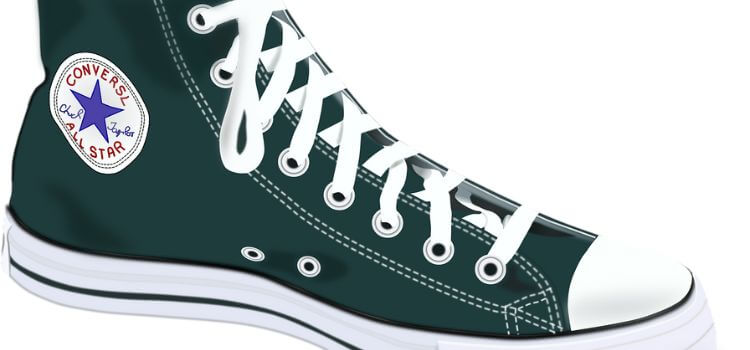
1920s
Birth of the now-iconic Chuck Taylor All-Stars.
1980s-1990s
An explosion of new styles catering to a broader audience.
Modern Day
Innovative materials and patterns, staying current with trends.
Anatomy Of Converse Shoes
The Anatomy of Converse Shoes offers a fascinating insight into their distinct style and design. A deep dive into their structure reveals if they are a fit for running enthusiasts. Converse shoes, known for their classic look and cultural impact, have a unique construction that sets them apart.
Materials And Construction
Converse shoes typically feature a canvas upper and a rubber sole. The materials speak to the shoe’s heritage, simplicity, and durability:
- Canvas Upper: Lightweight and breathable, ideal for casual wear.
- Rubber Sole: Offers traction and modest cushioning on urban terrains.
The shoes are stitched together, creating a rugged bond that stands up to wear. Yet, the materials are only sometimes engineered for the rigorous demands of running.
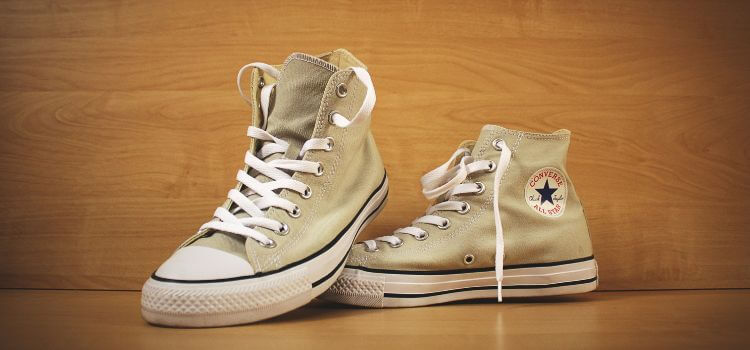
Support And Comfort Features
When examining Converse shoes for support and comfort, several features come to light:
| Feature | Description |
| Flat Sole | Creates a stable base but lacks the arch support needed for running. |
| Cushioning | Minimal cushioning is present, which may not suffice for high-impact running. |
The absence of specialized padding or shock absorption makes Converse less suited for running. For occasional sprints or light jogs, they might fare decently. Yet, their construction does not cater to the repetitive and prolonged impact runners experience.
Key Qualities Of Running Shoes
When searching for the perfect running shoes, certain features are essential. Optimal cushioning and stability keep your feet secure during impact. A good tread and grip are necessary for varied surfaces. Here’s what to know.
Cushioning And Stability
The right running shoes offer a delicate balance. They should cushion each stride. They must also provide enough stability for your gait. This prevents injuries and enhances comfort.
- Padding reduces the impact on joints.
- Arch support caters to different foot types.
- The heel counter contributes to lateral support.
- Midsole density determines the shoe’s firmness.
Tread And Grip
A reliable running shoe must secure your steps on various terrains. Durable outsoles with effective tread patterns are key. They offer superb grip across environments.
| Tread Feature | Running Surface | Importance |
| Deep grooves | Trail running | Prevents slips on dirt and gravel |
| Flexible ridges | Street running | Allows natural foot movement |
| Spike-like patterns | Track running | Grants speed and traction |
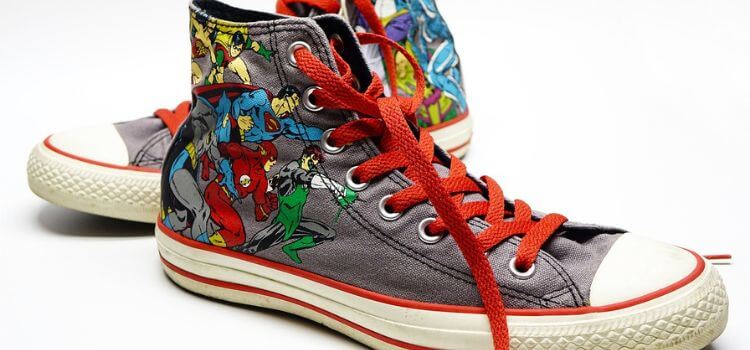
Converse In Action: Not A Runner’s First Choice
Converse sneakers hold a special place in the world of casual footwear. Their timeless design and versatility have made them a staple in fashion. Yet, when it comes to running, there may be better options. Let’s dive into why these shoes might stay back while you hit the track.
Limitations For Long-distance Running
Converse shoes are not built for the repetitive impact of running. Their flat soles lack cushioning, crucial for absorbing the stress running places on their feet. This can lead to discomfort and a less effective running experience.
- Limited arch support: This may cause foot fatigue.
- Heavy canvas material: Less breathable compared to running shoes.
- Flat, thin soles: Insufficient shock absorption for feet and joints.
Potential Risks Of Improper Footwear
Choosing the wrong type of shoes for running can lead to risks beyond discomfort. Inadequate support and cushioning could result in injuries.
| Potential Injury | Cause |
| Shin Splints | Repetitive stress on shinbone from poor cushioning |
| Plantar Fasciitis | Strain on the foot arch due to lack of support |
| Ankle Sprains | Insufficient ankle support and stability |
In addition, without specialized traction, Converse shoes could lead to slips and falls on uneven terrain.
It’s clear that Converse shoes, while classic, aren’t suitable for running. They work well in many scenarios but invest in proper running shoes for your runs.
Suitable Activities For Converse Footwear
When it comes to Converse footwear, many people think of style first. Yet, Converse shoes are also a choice for various activities. Let’s explore where Converse shoes shine.
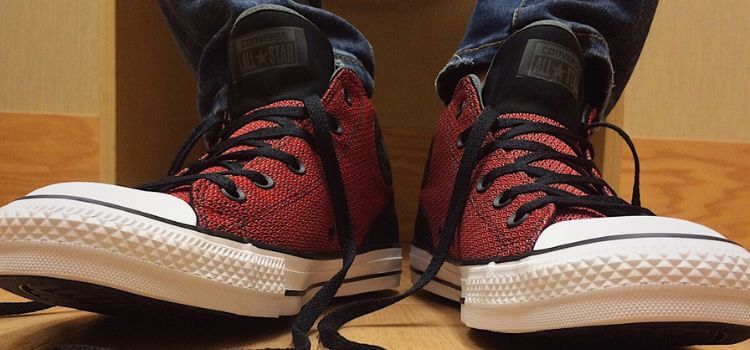
Casual Wear And Light Exercise
Converse sneakers are a perfect match for daily activities. Their timeless design complements every casual look. For light exercise such as walking or yoga, Converse can offer comfort. They are not, however, designed for high-intensity workouts. Keep activities low-impact to stay comfy.
- Walking the dog
- Running errands
- Yoga classes
- Casual bike rides
Converse And Athletic Performance
Converse shoes, known for their flat soles and minimal cushioning, are not the go-to for athletic performance. They lack the features needed for running, like shock absorption. Yet, for lifting weights or gym training focusing on leg strength, the flat sole of Converse can be quite beneficial.
| Suitable Activities | Not Recommended For |
| Weight lifting | Long-distance running |
| Gym sessions | High-impact sports |
Finding The Right Shoe For Your Runs
Choosing the right shoe for running can be a game-changer. Your comfort, performance, and overall running experience hinge on finding the ideal pair. Converse sneakers have a rich history, but are they suitable for your daily jog or sprint?
Features To Look For In Running Footwear
A top-notch running shoe supports and protects your foot. Pay extra attention to these essential features:
- Cushioning: Provides shock absorption for each step.
- Arch Support: Offers stability for your foot type.
- Breathability: Keeps your feet cool and dry.
- Fit: Ensures a snug yet comfortable enclosure.
- Traction: Maintains grip on different surfaces.
- Flexibility: Allows natural foot movement as you run.
- Durability: Understand the wear and tear of your runs.
How To Assess Your Running Needs
To determine if Converse or another brand fits your needs, consider your running habits:
| Aspect | Consideration |
| Frequency | How often do you run? |
| Distance | The length of your runs. |
| Terrain | Are you on a track, trail, or street? |
| Foot Type | Your arch shape and pronation. |
| Personal Comfort | Your unique preference for cushioning and fit. |
Match your shoe choice to your assessment. A personalized fit maximizes your running efficiency and minimizes injury risks. Converse sneakers may be tempting, but ensure they tick these boxes for your running needs.
Frequently Asked Questions For Are Converse Good Running Shoes
Is Converse Suitable For Long-distance Running?
Converse is designed for something other than long-distance running; it lacks the necessary cushioning and support. Running in Converse can lead to discomfort and potential injuries due to the flat soles and minimal shock absorption. It’s best to choose shoes made specifically for running.
Can Converse Shoes Improve Running Performance?
Converse shoes are not optimal for enhancing running performance. They lack the technology and design that running-specific shoes offer, such as energy return and foot stabilization, which are key for improving performance.
Is The Converse Flat Sole Good For Runners?
The flat sole of Converse could be better for runners. A flat sole does not provide the arch support and cushioning needed for the repetitive impact of running, which could lead to a higher risk of foot pain and injuries.
What Kind Of Support Do Converse Shoes Provide?
Converse shoes typically offer minimal support compared to running shoes. They have flat soles with little arch support and are designed for casual wear rather than for the specific needs of runners, like motion control and heel cushioning.
Conclusion
Wrapping up, it’s clear that while Converse sneakers hold a timeless appeal, they don’t quite cut it for running. Footwear tailored to a runner’s needs is crucial for performance and injury prevention. For those dedicated to the track, investing in a pair designed specifically for the sport remains the wisest choice.
Keep Converse for style, but stick to running shoes for the miles.
Related posts:
- Why Are Running Shoes So Expensive
- Can women wear men’s running shoes?
- Can I Wear Trail Running Shoes On A Treadmill
- How To Wear Orthotics In Running Shoes
- Are Yeezy Good Running Shoes
- Do Under Armour Shoes Run Small Or Big
- Are Brooks Running Shoes Made In The USA
- Are Ryka Shoes Good For Running
- Are Champion Running Shoes Good? Uncover the Truth!
- Do I Need A Stability Running Shoe
